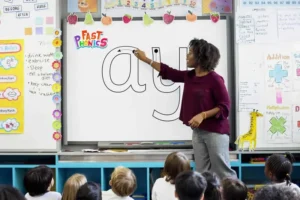
Source: peekadoodle
The Early Childhood Teacher Diploma is a teacher training program providing detailed knowledge of early education and skills in shaping the developmental years of young children. This course is a one-year program that qualifies aspirants to work in the preschool setting. With the evolving educational domain, the early childhood teacher diploma offers advanced teaching methodologies to support the growing years of children from infancy to preschool age. This certification has a gratifying scope with variation in job positions available. This diploma is the gateway to a fulfilling career, but also a stepping stone for long-term professional development.
What is the Scope of Early Childhood Teacher Diploma?
Aspirants with EECE Course qualification unlock various career opportunities globally. This program accurately prepares individuals with proficient teaching skills to work in any early educational setting. With in-depth knowledge of preschool teaching, the Scope of Early Childhood Teacher Diploma extends to various job destinations in education, and with experience, aspirants can even grow to leadership roles.
Early Childhood Teacher Diploma prepares individuals with different areas of expertise to excel in various job roles such as,
- Preschool teacher– Work as head teacher in a preschool setting and create a supportive, nurturing learning environment.
- Nursery Teacher– Nurture the developing years of toddlers in nurseries
- Special Educator– With ECCE Course diploma and knowledge of special education, works as a Special needs educator to improve the learning and developmental challenges of children.
- Curriculum Developer– Early Childhood Care and Education Course equips aspirants with expertise in planning lesson plans and curriculum. Individuals can pursue a career in designing syllabus for educational institutions.
- Daycare Teacher or Head- Create a stimulating environment for toddlers and support their growth. Individuals can start their day care centre and manage all functions.
The Scope of Early Childhood Teacher Diploma not only offers rewarding career opportunities but also professional growth. Aspirants pursue their passion for nurturing the early lives of young children and make a lasting impact on their academic performances by acquiring this ECCE Course Diploma.

Source: icaresoftware
What is the Age of Early Childhood Education?
It is a crucial and remarkable phase that supports the inclusive development of young children. This nurturing approach to education is provided from infancy to seven years. It offers a structured learning and development environment to address every age appropriately. Children develop social interaction, cognitive enhancement, physical strength, and foundational academic skills (reading and writing) during this specialized education.
Let’s understand the impact of Early Childhood Education on different age groups:
Infancy:
- This age range is from zero to two years, it is the initial stage of development, where children begin to crawl.
- Early education provided at this age benefits physical, social, cognitive, and emotional development.
- Children understand the environment with their senses, and the playgroup or daycare environment helps them in this exploration.
Toddlerhood:
- The age range, from two to four years, where children start to talk, walk, eat, and respond to adults.
- With high-quality early education or nursery learning, children achieve fine/gross motor skills, physical strength, and cognitive understanding. It develops children’s interest in play and learning.
Preschool Age:
- It ranges from three years to five years, where children become capable of attending junior kindergarten.
- They are introduced to more structured learning of basic literacy, math, social interaction, and basic manners at this age.
Pre-primary age:
- This age group ranges from five to seven or eight years of age, and children begin their preschool education.
- They receive advanced academic learning and are prepared for primary transition.
Starting early childhood education at the right age helps children to grow to their full capacity and achieve academic success. It has the eternal benefits of cognitive enhancement, increased creativity, and development of ethical manners.

Source: downtoearth
How to Teach Early Childhood?
Early Childhood Education is focused on shaping the growing phase of children in a productive environment. Effective nurturing and teaching are indispensable during the early developmental years of children. To teach early childhood, patience and dedication are the keys to supporting the growing phase. Early educators aim to shape the physical development, academic performance, social interaction, and intellectual capabilities.
Let’s examine some of the most effective ways to teach young children:
Interactive learning:
This involves conducting interactive sessions like storytelling, music, or rhymes that help and develop listening and imaginative skills.
Play-based teaching:
- Playing includes indoor and outdoor games.
- Music, dance, art, craft, and treasure hunt are included in indoor games that benefit cognitive and creative abilities.
- Outdoor games are harmlessly designed to develop muscle strength.
Positive Support:
Appreciate the positive tasks of children by praising them verbally or with rewards, which motivates them to continue their good behavior.
Parent Involvement:
- Engage with parents and provide them with activities to be conducted at home.
- This partnership supports the overall growth of young children.
Regular Assessment of Children:
- The best way to examine the progress of children is to conduct regular observation.
- It helps teachers to recognize their teaching styles and modify them accordingly.
Creating real-life examples:
- This is applied in teaching children science, where a teacher can plant a small seed and, by daily watering, help children understand how plants grow over time.
- Coloring mixing activities also help to understand how different shades of colours are formed.
With the right training, deeper knowledge, and effective skills, teachers can successfully teach in early education. Pursuing an Early Childhood Care and Education Course from Vidhyanidhi Education Society (Govt. Regd.) institution, helps aspirants acquire advanced and accurate early education teaching skills.
“Shape young minds with Vidhyanidhi Education Society’s ECCE Course start your journey today!”
For more information of ECCE Course Call/Whatsapp on +919869546913 /+919869866277
To download brochure of ECCE Course, Click Here!
FAQs
Is Early Childhood Education Easy?
Early Childhood education is easy for passionate aspirants who love to work with young children. It requires patience and enthusiasm to influence the young lives.
What are the Weaknesses of Early Childhood Teachers?
Managing the bad behaviours of children can be challenging, but teachers with strong critical thinking and problem-solving abilities overcome this weakness.
What is the Qualification for Early Childhood Education?
The qualification for early childhood education is a minimum of 10+2 education.



